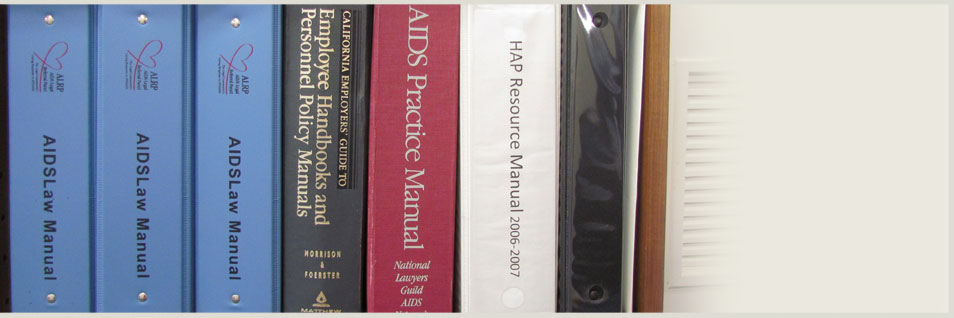AIDS law manual
ALRP has provided the Fourth Edition of the ALRP AIDS Law Manual: A Manual on Providing Legal Services to People with HIV/AIDS, edited by Ramon Gonzalez, Esq., to be used by Panel attorneys.
The complete chapters of the AIDS Law Manual are posted below.
Funding for this edition of the AIDS Law Manual was provided, in part, by The Evelyn & Walter Haas, Jr. Fund and the VanLobenSels/RembeRock Foundation.
Introduction
The purpose of the ALRP AIDS Law Manual is to provide specific legal education regarding HIV/AIDS law to our volunteer attorneys. The Manual is the result of tireless efforts by numerous individuals representing various organizations striving for greater advocacy on behalf of the HIV/AIDS community in the San Francisco Bay Area. Specifically, we hope to increase the skill and capacity of the legal community to handle the intricacies of HIV/AIDS-related law and representation.
Issue Spotting
Living with AIDS can mean hours of treatment or therapy. It can mean loss of memory or physical mobility. It can mean poverty. Survival, whether emotional, medical, or financial, can overshadow the legal aspects of one’s life. By issue-spotting legal problems early on, we can help clients stave off crises and allow them to focus their energy on their health and well-being.
Testamentary Documents
A volunteer attorney with an AIDS legal services program simultaneously assumes different roles of therapist, mediator, social worker, emotional support counselor and legal adviser. But nowhere are the demands on an attorney more challenging than in drafting testamentary documents for a person with a life-threatening illness.
Employment Discrimination
Despite a web of federal, state, and local laws prohibiting discrimination in employment on account of disability, persons with AIDS and HIV infections continue to be the victims of illegal employment practices. These practices include failure to hire, illegal testing, demotion, transfer, harassment, failure to stop harassment, denial of leave, and termination.
Public Accommodations
Both federal and California law prohibit private businesses from discriminating against clients and customers with disabilities. In many respects the federal and state requirements are similar, particularly as some California laws expressly incorporate the protections of federal law. However, California attorneys should be aware that federal and California law differ in some regards, with state law often providing more expansive protections. Thus, each potential cause of action must be individually examined with attention to its specific protections, limitations and remedies.
Insurance and Employee Benefits
Living successfully with HIV requires many things: positive attitude, good social and family support and, especially, access to quality medical care. In the U.S. today, the cost of medical services is so insanely high that, in reality, they are available only to individuals who are insured or are eligible for some form of public benefits. For many people with HIV, health insurance has become the most important factor in choosing, changing or leaving employment. And in some instances health or disability benefits are the specific site of HIV discrimination.
Public Benefits
There is a myth out there that public entitlement programs are designed to be navigated by the public. Anyone who has ever tried to walk into a Social Security office to get a question answered knows how untrue that myth is. Dealing with a government bureaucracy is frustrating at the best of times, but doing so while facing a life-threatening illness — in order to access disability and health benefits — is a tremendous burden. Yet, because of its tremendous drains on health and income, almost all people with AIDS need some form of public assistance. Therefore, no matter what type of legal matter you are helping an ALRP client with, be aware that this struggle to maintain income and health coverage is always a piece of the backdrop.
Creditors and Bankruptcy
The main goal for the ALRP volunteer attorney is to get the creditor off the client’s back. The tactics and procedures an attorney uses to do this are simple and straightforward. They basically involve letting the creditor know that you and your client are aware of the laws that limit bill collectors’ tactics in obtaining payment. The client does not have to go as far as declaring bankruptcy in order to protect himself, and bankruptcy should probably be avoided because it takes control of all the debtor’s property and may have additional unwanted results.
Family Law
A parent with HIV has numerous special decisions to make when considering the future care of a minor child. The first two parts of this chapter deal with issues that are likely to arise when the parent is going through or has gone through a divorce with the child’s other parent.
Immigration
The Homeland Security Act of 2002 abolished the Immigration and Naturalization Service (INS) and created the Department of Homeland Security (DHS), effective March 1, 2003. Within the DHS, three bureaus were created to take over the same functions: U.S. Citizenship and Immigration Services (USCIS), U.S. Immigration and Customs Enforcement (ICE), and U.S. Customs and Border Protection (CBP). USCIS administers immigration benefits and services. These services include processing family-sponsored and employment-based petitions, naturalization applications, and asylum and refugee cases. ICE enforces immigration laws, customs laws and protects over 8,000 federally owned and leased buildings within the United States and its territories. CBP enforces immigration and customs laws at and between the ports of entry into the United States.
Fair Housing and HIV/AIDS
Stable housing is absolutely essential for people living with HIV/AIDS. Increasingly, the connection between housing and health has become clearer; without stable housing, it is impossible for a person living with HIV/AIDS to maintain the complex treatment regimen required to manage this illness. Housing issues have come to represent close to one third of ALRP cases. In response to this growing need, ALRP initiated the AIDS Housing Advocacy Project (AHAP) in 1998. ALRP undertook a dramatic shift in how it serves clients by moving away from its traditional referral model of service and hiring two staff attorneys to represent clients with housing issues.
HIV Consumer Rights
One of the challenges in dealing with HIV/AIDS in San Francisco is navigating its complicated service delivery system. In San Francisco, there are approximately 60 Ryan White CARE funded agencies that provide a comprehensive array of services to the HIV/AIDS community. These services include Primary Medical, Case Management, Dental Care, Housing, Food Assistance, Mental Health Services, Legal Services, Transportation, Substance Use, Complementary Treatments and Home Health Care.
Criminal Issues
One of the most significant legal developments to affect the HIV/AIDS community since the publication of the 1995 edition of this manual has been the threat of criminal prosecution for behavior directly or indirectly related to one’s HIV/AIDS status. This chapter specifically addresses relatively recent laws relating to medical marijuana, intentional transmission of HIV/AIDS, and viatical settlements.
Prisoner’s Rights
The astonishing statistics, reflecting the rapid increase in HIV/AIDS within the prison community, bring with them a multitude of legal issues. This chapter addresses the wide range of concerns that prisoners living with HIV/AIDS might bring to an ALRP attorney. These prisoners have many of the same needs as those living outside the prison setting, including access to health care, treatment, and counseling. However, prisoners also have very distinct and critical needs, such as protection in the confidentiality of their HIV diagnosis throughout the prison, and protection from harassment and discrimination by guards and inmates. Despite the disproportionately high HIV infection rate among prisoners and their pressing needs, most penal systems in the U.S. have not developed comprehensive strategies for HIV treatment, education, prevention, or harassment reduction.
Transgender Law
As the demographics of HIV infection have changed over time, certain communities have been disproportionately impacted. The 2001 Census Report estimates that six percent of all people living with HIV/AIDS in San Francisco are transgender. The transgender community in San Francisco is experiencing extremely high rates of HIV infection. Recent research found a 24 percent HIV infection rate among the estimated 5,000 transgender individuals in San Francisco. Clearly an awareness of the legal issues related to this population is critical for legal practitioners.
Confidentiality – UPDATED
Most people with HIV face some issue regarding public knowledge of their status. While previous chapters dealt with the discrimination they face in obtaining employment, insurance, and access to public accommodations, public knowledge of their status may easily touch other parts of their lives, such as child custody or maintenance of personal relationships.


